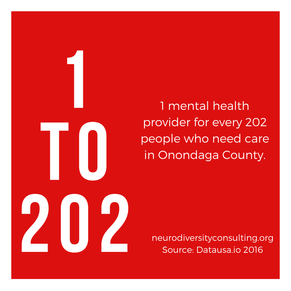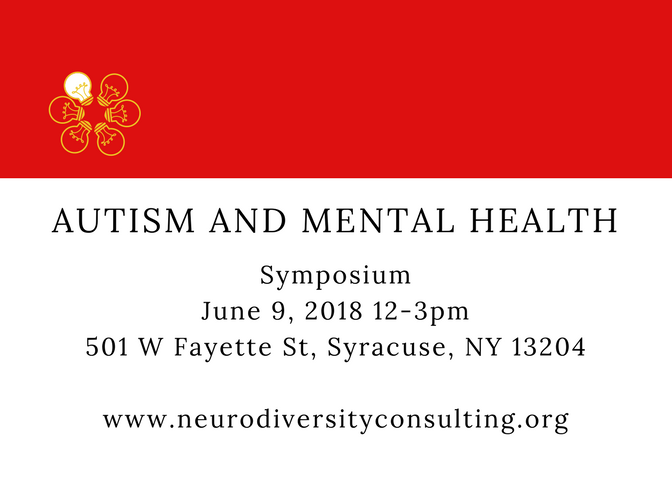|
We are deeply saddened by the death of Judson Albahm amid his mental health crisis. We are proud of Judson for his forethought in seeking help in facing his challenges and disappointed that he could not find the help he needed. Central New York families are sadly familiar with the struggle to access appropriate mental health care. We mourn with Judson’s family and join with them in calling for the marshaling of resources to adequately care for vulnerable members of our community like Judson.
The closures of outpatient mental health facilities in Onondaga County have left families adrift as they seek help for their loved ones and for themselves. The inadequate understanding of the needs of autistic people further leaves people like Judson with limited options for treatment or support during a crisis. We encourage families in crisis to reach out to Upstate University Hospital’s Emergency Psychiatry Service, located at the downtown campus, for care. In service, Sanchia A. Callender, Inc Autism Mental Health Initiative Advisory Council Parents for Public Schools of Syracuse, Inc Neurodiversity Consulting LLC The Academy of Excellence, Inc Joshua Michael King for Students Masking and Kompany
2 Comments
by Liza Citron  Educators can make the best experiences for students in the classroom. Educators can make the best experiences for students in the classroom. As teachers are going back to school, many might have an autistic or otherwise neurodivergent child in their class -- perhaps for the first time. Educators might reasonably wonder where to begin in tailoring the classroom experience to that child -- connecting to the child as an entirely new experience for the teacher. How different is the autistic experience to the neurotypical one? How does autism affect a child in their formative years? What changes should be made for the child to help them connect to the curriculum and the teacher, and to help them succeed? These are all questions teachers might be asking themselves as the “mad rush” to prepare for the school year comes into full swing. All these questions may seem daunting to the teacher, especially ones new to their classroom. Everything comes down to paying attention to and carefully observing the child -- and, of course, listening to what they may tell you. Careful observation can tell you what the child’s most significant struggles are, and conversely, what their greatest successes or strengths are or maybe in the future. As an autistic adult, I don’t personally know the neurotypical experience. I can, however, compare my autistic experience with descriptions from neurotypical friends and family members. My perspective helps provide insight into neurotypical and neurodivergent experiences that impact the classroom. One of the main differences I have noted is the capacity for sensory input and susceptibility towards over-stimulation. Things neurotypicals might not even notice can be “deafening,” if you will, to an autistic individual -- and can cause either shutdown or meltdown, depending on the situation. As such, the best learning/work environment for many autistic people, and neurotypical people is one with the least sensory stimuli possible. In such a situation, it is easier to maintain concentration, and much easier to lower anxiety levels, both of which provide a more productive mental state. Another difference to consider, especially with young children, is the theory of mind -- seeing situations from another’s perspective. Theory of mind is an aspect of human behavior and neurology that is important in relationship building and learning. Contrary to what some may think autistic people are not insensitive to what others need or want. However, it can often be difficult for us to see those needs and wants in the context of a situation. Providing an environment for role-play, or anything that requires “characters” can often help develop a person’s understanding of the theory of mind. Every individual, autistic or not, will have their levels and specifics of needs, struggles, and strengths. The above are just two of the multitude of ways in which the autistic experience can differ from the neurotypical one. Taking the time to learn, understand, and account for these individual aspects allows educators to set themselves and their students up for success in the new school year. Read more Neurodiversity Rewires Conventional Thinking About Brains Join us for the Autism and Mental Health Symposium June 9, 2018 to explore barriers to access to mental healthcare for people on the autism spectrum. Register here.
 It’s well established in research literature that people with autism and related disorders have an increased vulnerability to mental health challenges. Despite this fact the mental health resources available to autistic people and their families in their communities are limited. In Onondaga County the clinician to patient ration in mental health is 1 to 202. In that number few are able or willing to meet the mental healthcare needs of autistic people. Families and individuals are left with little or no options for addressing their mental health care needs. We can do better. Register now for our Autism and Mental Health Symposium to explore the barriers to access. Be part of the solution. The following are written comments submitted to the New York state Autism Spectrum Disorder Advisory Board on February 13, 2018 as part of a public forum.
The public has been asked to comment on the following questions.
Representation of autistic voices and experiences are imperative for the advisory board to make informed decisions about the lives of autistic people and their families. The distinction that is often drawn between “low functioning” and “high functioning” individuals on the spectrum is a distinction without meaning when it comes to insuring appropriate systems of support are in place for families and individuals. The self-direct program has the potential to be a game changer in the lives of people with disabilities. For some it has been. In my experience it saddles families and individuals with an unpaid part time job filling out paperwork and resolving mistakes made by various agencies with little to show for all that effort. Time delays in processing paperwork by agencies, inconsistent policies, and little to no oversight by OPWDD make the program almost unusable. Families and individuals need consistent guidelines for agencies involved in self-direct as well as a clear grievance process with state regulators when a problem with an agency needs to be addressed. State Department of Education regulations often function as an impediment to the education of students with IEPs and 504 plans. Families and educators need clear guidelines, free of ambiguities, that comply with IDEA. We need regulations and guidelines with flexibility to facilitate a student’s academic success rather than function as gatekeepers and roadblocks frustrating student progress. Families need a clear path to accountability for school districts that routinely fail to comply with IEPs and 504 plans. In CNY alone, several districts are notorious for forcing students and/or refusing to comply with IEPs and 504 plans. Ask the families and self-advocates in the region for the details. On the school funding front urban and small rural school districts need adequate funding to meet the educational needs of all students. Our students’ success is continuously hamstrung by needy schools held hostage by the state budgeting process that consistently fails to consider what it actually costs to educate a student. This isn’t a call to bemoan how much it costs to educate our students. This is a call to do it right and stop scratching our heads about why our students keep failing. Accountability, transparency, and accessibility are integral parts of service delivery for families and individuals living with autism. Meaningful oversight of agencies offering services is lacking leaving people at the mercy of a bureaucratic behemoth. We need consistent policies that don’t change midstride with zero input from the people who live with the impact of those changes. The must be recognition that there are real people with hopes and dreams impacted by policy changes. We need legislators and heads of agencies like OPWDD and OMH to listen to our needs rather than tell us what our needs are and how they are going to meet them. Families and individuals need ground floor access to the decision-making process. Nothing about us without us. Several parents and professionals spoke today about the need for better mental health services for families and individuals on the autism spectrum. As part of a CNY advocacy group about this issue I’ve prepared information to share with legislators about the state of mental health services and the needs in CNY. That information is included with these comments. Decades of advocacy have produced growing numbers of autistic people who are speaking up for themselves. Whether they speak with a voice from their mouths, with the assistance of technology, or with behavior. Listen to them. Sincerely, Samantha JC Pierce NeuroDiversity Consulting Sanchia A Callender Foundation Gluten free diets, casein free diets, elimination diets, supplements, or any combination thereof. Are they any good for people on the autism spectrum? Research still says, no doesn’t really look like it.
Over a decade ago when my children were first diagnosed with autism gluten free and casein free diets were the thing to do to treat autism. I did some digging to find the scientific basis for the belief in this special diet. What I found were studies with small sample sizes, no control groups or poorly matched control groups, no blinded or doubled trials (researchers and participants often knew what they were getting), subjective measurements of outcomes, and no clear mechanism for how the diet was supposed to work or what is was supposed to improve. I tried a gluten free diet anyway because, hey it was only food. After a year my children were still their autistic selves. I left behind the expensive food and dubious claims about special diets. Fast forward to today and there have been some high-quality studies done on not only gluten free and casein diets but also the various restriction/elimination diets that parents try as well as the supplements they are often encouraged to use as treatment for their children’s autism. The results are still underwhelming. *From December 2007. This brilliant advertising campaign was supposed to raise the profile of autism or something. Still not sure why so many learned people thought this was an okay way to present autism and the people who live with autism to the world. This is quite repulsive. In a society that seems to put self esteem above all else for children it seems that it is quite alright to degrade individuals with developmental delays and psychiatric disorders and perpetuate stereotypes about them under the guise of raising awareness. The kids really did spend Christmas playing with the boxes the toys came in. *Originally posted on my personal blog.
Some days it feels like being a parent requires me to be a general education specialist, a special education expert, a psychologist, a neurologist and neuroscientist, a geneticist, an education law specialist, a diplomat, and a hunting dog all at the same time. It is exhausting. But it’s what you do. Will there be a time when I’m not going to advocate for my children and others like them? When I’m dead maybe. My kids want to go to college. That means it’s my job to make sure everyone does their job to give my children that opportunity. Sometimes that means holding my children to a higher standard than others have for them. Sometimes that means cutting them some slack. It’s a delicate balance that requires knowing the child in question and what best motivates them. Mostly it requires being present and aware of my child and their needs. It means setting in my mind that they can achieve their goals and working alongside them to make sure it happens. I fall into bed exhausted every night. My children do as well. We all work hard fighting for our futures. It is so worth the battle. While I’m doing all that I also get to do the regular parent stuff. The nurturing, the loving, the laundry, the cooking, the cleaning, the teaching of life skills and how to be a decent human being. I need a nap. People, parents, advocates, therapists, medical and school professionals, throw around words like prevention, cure, and treatment when talking about autism as if they are interchangeable. These terms are rarely explicitly defined. It's just assumed that everyone in the room knows what you're talking about. This vagueness and imprecision with language muddies the waters when trying to have meaningful discussions about helping autistic people.
Let's start with the word prevention. Prevention is proactive, stopping something, something you think is bad, from happening. There are a lot of people invested in finding ways to make sure more autistic people don't happen. Their primary tool is the flood of information about the genetics of autism that has become known over the last decade or so. I'm excited about the great body of knowledge about autism that science is amassing. But as someone raising autistic children and advocating for society to value the humanity of autistic people I can't say that I'm excited about using these scientific discoveries to find ways to prevent others like my children from coming into existence. While some search for ways to use genetic markers to eradicate autism I'm not reassured by insistences that prevention is only for the most "severe" cases. Severity here being defined as those people who would never be able to dress themselves, feed themselves, or speak. This raises several questions. Who defines the severity of autism? Right now, the criteria are arbitrary at best. When is the determination of severity made, before conception, pre-implantation, first trimester? Good luck with that moral and ethical quagmire. Arguing that people with more intense needs shouldn't exist doesn't make the argument for autism prevention any more palatable. Throw into the prevention mix those who still cling to disproven causation theories about autism. Their beliefs about what causes autism lead them to choose from a range of preventative measures that require significant financial output, emotional investment, and leave them vulnerable to adverse health outcomes. We've already seen the results of some those choices with recurring outbreaks of previously rare vaccine preventable diseases. I don't want to repeat myself just now so I'll leave that topic alone for the moment. Suspending a student because of behavior related to their disability is illegal. Despite this fact suspension is still the go-to response for many schools and school districts. School districts have been penalized for disproportionately suspending students with disabilities and thus violating their rights. If your school/school district is known for routinely suspending students with disabilities over behavior it is up to parents and guardians to hold them accountable for these illegal actions. If students with disabilities are routinely suspended over behavior it means that schools have failed, and failed spectacularly, at meeting their legal and moral obligations to students.
So how do we help our students experiencing behavior challenges at school? Any student with behavior challenges at school is due a Functional Behavioral Assessment (FBA). FBAs are a part of federal and state education regulations (see resource list below). The purpose of a FBA is to identify behaviors that pose a challenge to a student’s learning, identify what in the student’s learning environment precedes or triggers the behaviors, and what follows from the behaviors. FBA can also identify behaviors that help support a student in their learning environment. |
Categories
All
Archives
December 2021
|
Photo from Hayzphotos

 RSS Feed
RSS Feed
